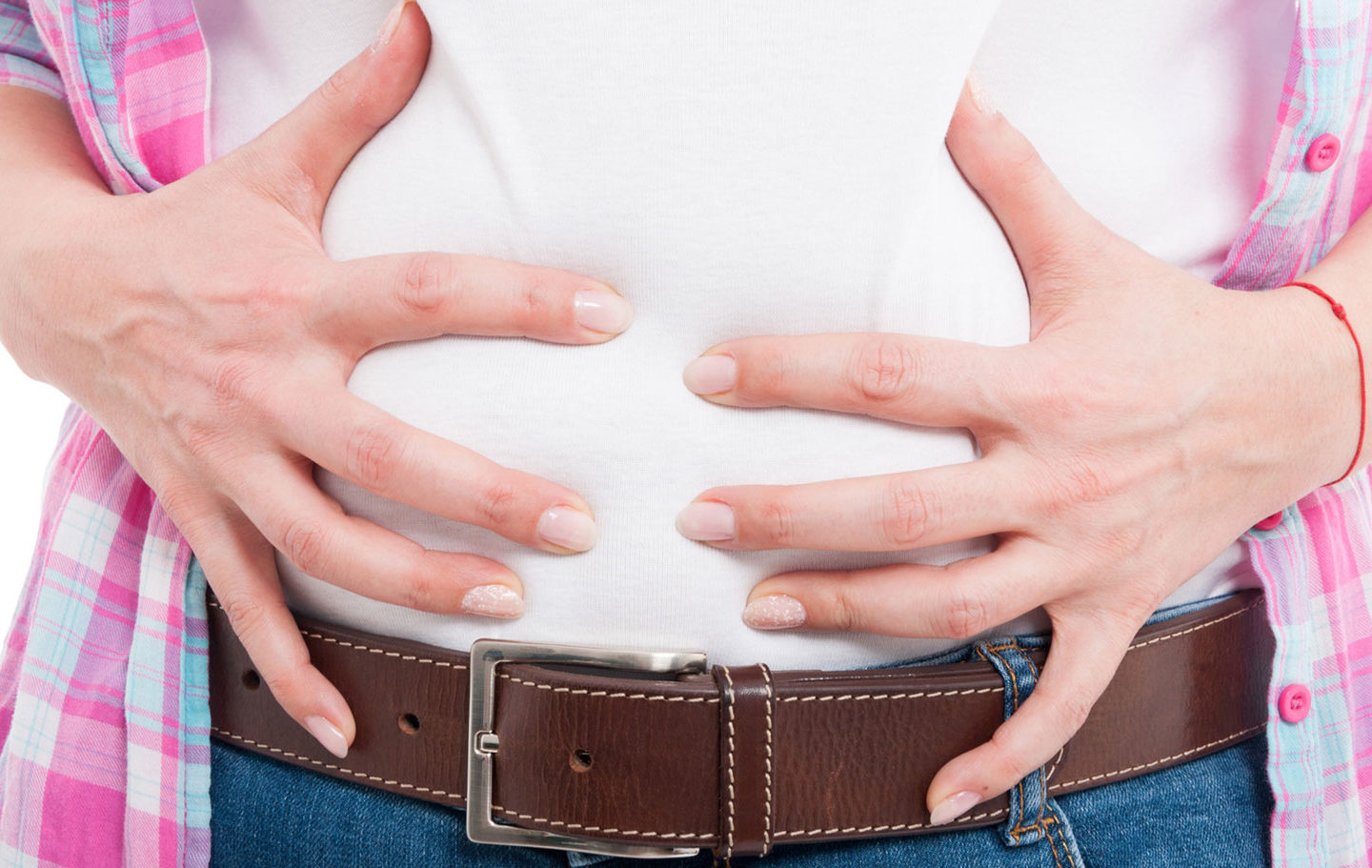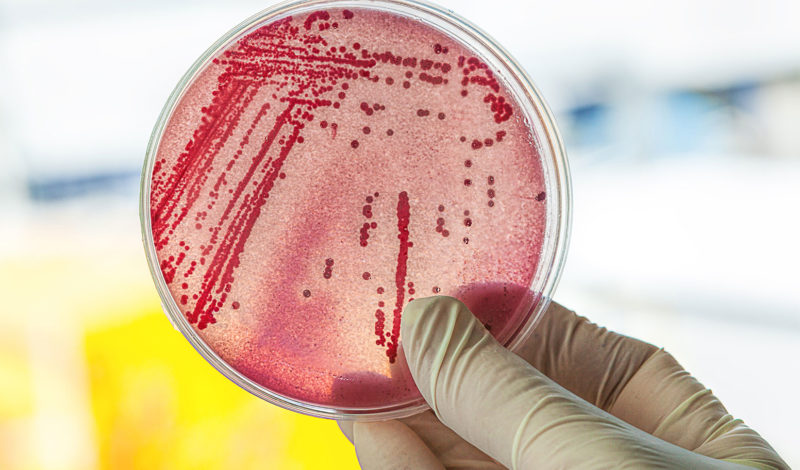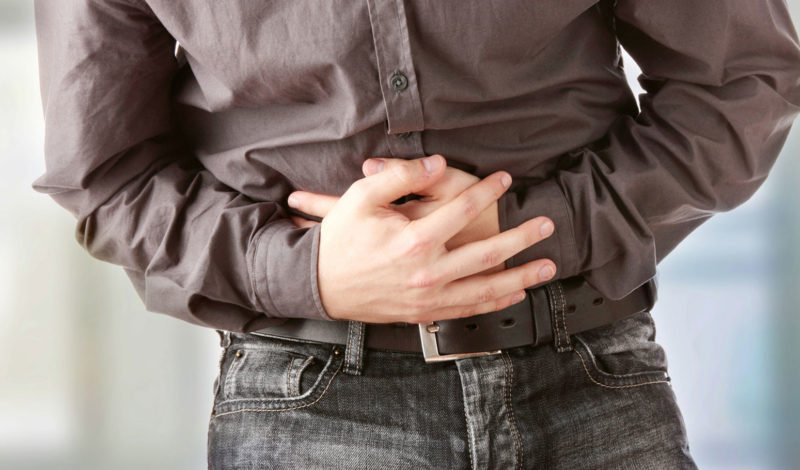What are E. coli bacteria? E. coli bacteria – or simply E. coli bacteria – are considered to be the [...]

How intestinal bacteria work with flatulence
Your stomach sometimes feels unpleasantly bloated or very hard after eating or in the morning? You are not alone with this. According to surveys1 a large proportion of Germans regularly feel bloated. The cause of the unpleasant gases is intestinal bacteria: Strong flatulence is often a warning sign of bacterial colonization.
Flatulence is a natural phenomenon. As long as they do not occur more than 24 times a day, doctors speak of normal digestion. After all, the intestine can contain up to 1.5 litres of gas in the meantime. However, if intestinal gases escape more frequently or in large quantities, this may be due to an imbalance in the intestinal flora. Although flatulence can theoretically just as well be caused by intolerances or swallowed air, studies have shown that an imbalance between different types of intestinal bacteria can also cause flatulence.
Which types of bacteria of the intestinal flora cause flatulence?
Thousands of bacterial microorganisms live in the intestine. But not all types of these intestinal bacteria cause flatulence. Gases come mainly from:
which produces hydrogen, methane and sulphur.
which together with the genus Bacteroides produces most of the intestinal gases.
which can cause diseases from a certain number of cases.
which represent only about one percent in a healthy intestinal flora.
A widespread cause of flatulence is an overproduction of intestinal gases. This can have different reasons. Certain foods may be the cause, but sometimes there is a surplus of gas-forming intestinal bacteria in the intestinal flora. An inflated stomach is everyday life for you? In this case you should first consult a doctor. If he or she rules out diseases of the digestive organs, if you get enough exercise and eat a balanced diet, the above-mentioned intestinal bacteria probably cause flatulence.
With the right intestinal bacteria against flatulence
In 2014, a study2 ,showed that probiotics help babies against colic. A follow-up study showed that gas-forming proteobacteria dominate in the intestines of flatulent infants. The authors of the study found only a small number of Bifidobacteriae and Lactobacilli in the intestinal flora. Flatulence and colic frequently occur in babies because the natural microbiome is not yet fully developed. According to the study, the development of the intestinal flora can be supported by the administration of probiotics.
But what does that mean to you? Well: Studies like this suggest that a balance among intestinal bacteria helps against flatulence. Although all probiotics support intestinal movement, the type of intestinal bacteria ingested is decisive in fighting too much gas in the intestine. For flatulence, experts specifically recommend Bifidobacterium infantis and Lactobacillus casei Shirota.
But to stop you feeling bloated, you can support your intestinal bacteria not only with probiotics. Just as important are aspects like:
- slow and conscious eatingn
- at least 30 minutes of exercise per day
- Relaxation
- well-tolerated food
You don’t know which foods you tolerate best? The scientists from BIOMES will be happy to help you. The composition of your intestinal flora determines which diet is best suited to you. You can effectively combat flatulence and other gastrointestinal complaints with the help of personalized recommendations based on an analysis of your intestinal bacteria.
- Sources:
- Khalighi A R, et. Al. (2014). Evaluating the efficacy of probiotic on treatment in patients with small intestinal bacterial overgrowth (SIBO) – A pilot study. Indian J Med Res 140:604-8
- Ghoshal UC, Shukla R, Ghoshal U. (2017) Small Intestinal Bacterial Overgrowth and Irritable Bowel Syndrome: A Bridge between Functional Organic Dichotomy. Gut Liver. 2;11(2):196-208. doi: 10.5009/gnl16126
- Staudacher HM, Whelan K. (2017) The low FODMAP diet: recent advances in understanding its mechanisms and efficacy in IBS. Gut.;66(8):1517-1527. doi: 10.1136/gutjnl-2017-313750
- Blähungen, Luft im Bauch – Ursachen | Apotheken-Umschau
- Ritchie ML, Romanuk TN. (2012) A meta-analysis of probiotic efficacy for gastrointestinal diseases. PLoS One.;7(4):e34938. doi: 10.1371/journal.pone.0034938
- Steinmüller, Dr. Rolf. „Escherichia coli“. Ernährungsumschau, Bd. Ernährungs Umschau, Nr. 7/10, 2010, S. B13–28, www.ernaehrungs-umschau.de/fileadmin/Ernaehrungs-Umschau/pdfs/pdf_2010/07_10/EU07_2010_B25_B28.qxd.pdf.
- Bolca S, Verstraete W. (2010) Microbial equol production attenuates colonic methanogenesis and sulphidogenesis in vitro. Anaerobe.;16(3):247-52. doi: 10.1016/j.anaerobe.2010.03.002
- Flavia, I. et al (2014): Prophylactic Use of a Probiotic in the Prevention of Colic, Regurgitation, and Functional Constipation. A Randomized Clinical Trial. Jamia Pedriatics 2014;168(3):228-233. doi:10.1001/jamapediatrics.2013.4367



